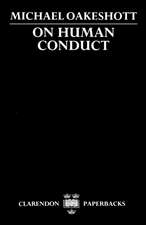Agency and Integrality: Philosophical Themes in the Ancient Discussions of Determinism and Responsibility: Philosophical Studies Series, cartea 32
Autor Michael J. Whiteen Limba Engleză Paperback – 21 dec 2011
Din seria Philosophical Studies Series
-
 Preț: 407.78 lei
Preț: 407.78 lei - 15%
 Preț: 644.95 lei
Preț: 644.95 lei - 18%
 Preț: 1120.18 lei
Preț: 1120.18 lei - 18%
 Preț: 1005.43 lei
Preț: 1005.43 lei - 15%
 Preț: 640.06 lei
Preț: 640.06 lei -
 Preț: 381.21 lei
Preț: 381.21 lei -
 Preț: 391.61 lei
Preț: 391.61 lei - 15%
 Preț: 640.88 lei
Preț: 640.88 lei - 15%
 Preț: 639.25 lei
Preț: 639.25 lei - 18%
 Preț: 1221.51 lei
Preț: 1221.51 lei - 18%
 Preț: 947.18 lei
Preț: 947.18 lei - 18%
 Preț: 955.56 lei
Preț: 955.56 lei - 18%
 Preț: 950.96 lei
Preț: 950.96 lei - 15%
 Preț: 645.47 lei
Preț: 645.47 lei - 15%
 Preț: 641.38 lei
Preț: 641.38 lei - 15%
 Preț: 644.82 lei
Preț: 644.82 lei - 18%
 Preț: 950.66 lei
Preț: 950.66 lei -
 Preț: 386.00 lei
Preț: 386.00 lei - 15%
 Preț: 644.82 lei
Preț: 644.82 lei - 15%
 Preț: 642.18 lei
Preț: 642.18 lei - 15%
 Preț: 643.48 lei
Preț: 643.48 lei - 18%
 Preț: 944.99 lei
Preț: 944.99 lei - 15%
 Preț: 638.76 lei
Preț: 638.76 lei - 20%
 Preț: 553.25 lei
Preț: 553.25 lei - 20%
 Preț: 560.30 lei
Preț: 560.30 lei - 18%
 Preț: 951.29 lei
Preț: 951.29 lei - 18%
 Preț: 893.40 lei
Preț: 893.40 lei - 20%
 Preț: 566.75 lei
Preț: 566.75 lei - 18%
 Preț: 951.77 lei
Preț: 951.77 lei
Preț: 387.75 lei
Nou
Puncte Express: 582
Preț estimativ în valută:
74.20€ • 77.00$ • 62.02£
74.20€ • 77.00$ • 62.02£
Carte tipărită la comandă
Livrare economică 17-31 martie
Preluare comenzi: 021 569.72.76
Specificații
ISBN-13: 9789401088572
ISBN-10: 9401088578
Pagini: 304
Ilustrații: 296 p.
Dimensiuni: 152 x 229 x 16 mm
Greutate: 0.41 kg
Ediția:Softcover reprint of the original 1st ed. 1985
Editura: SPRINGER NETHERLANDS
Colecția Springer
Seria Philosophical Studies Series
Locul publicării:Dordrecht, Netherlands
ISBN-10: 9401088578
Pagini: 304
Ilustrații: 296 p.
Dimensiuni: 152 x 229 x 16 mm
Greutate: 0.41 kg
Ediția:Softcover reprint of the original 1st ed. 1985
Editura: SPRINGER NETHERLANDS
Colecția Springer
Seria Philosophical Studies Series
Locul publicării:Dordrecht, Netherlands
Public țintă
ResearchCuprins
One: Introduction: The Immortal Chimpanzee at its Typewriter.- A. Plenitude and the Temporal-Frequency Model of the Modalities.- B. Plenitude and Atomist Cosmology?.- C. Summary and Conclusion.- Notes.- Two: The Legacy of Aristotle.- A. Pitfalls.- B. Three Types of Necessity.- C. Aristotle’s Fundamental Modal Principle.- D. Absolute Necessity and the Ultimate Mover.- E. Aristotle and Determinism.- F. The Energeia-Kin?sis Distinction and Aristotelian Determinism.- G. Summary and Conclusion.- Notes.- Three: Diodorean Fatalism.- A. Diodorus the Megarian?.- B. Diodorus’Denial of Motion.- C. Diodorus’ Account of the Alethic Modalities and His Fatalism.- D. The Master Argument and Diodorean Fatalism.- E. Summary and Conclusion.- Notes.- Four: Chrysippus’ Compatibilism.- A. The Avoidance of Necessity and Retention of Fate.- B. “Obscure Causes” and Chrysippus’ Compatibilism.- C. “What Is Up to Us” and Fate.- D. Chrysippean and Spinozistic Reconciliationism.- E. Summary and Conclusion.- Notes.- Five: Peripatetic Polemics.- A. Stoic and Peripatetic Conceptions of Heimarmen?.- B. Causal/Temporal Sequences: Stoic and Peripatetic Conceptions.- C. A Fronte Conditional Necessity.- D. A Tergo Conditional Necessity.- E. Summary and Conclusion.- Notes.- Six: Cosmic Cycles, Time, and Determinism.- A. Two Versions of Cosmic Cycles.- B. Cosmic Cycles and the Temporal-Frequency Model of the Modalities.- C. Cosmic Cycles and the Actuality of the Future.- D. Summary and Conclusion.- Notes.- Seven: Plotinus and Human Autonomy.- A. Book III of the Nicomachean Ethics and its Aftermath.- B. A Stoic Metaphysical Move.- C. Moral Responsibility and Aristotle’s Predicament.- D. Plotinus and Ennead 3.- E. Plotinus and Ennead 6.- F. The Constative and Performative Views ofResponsibility-Attribution.- G. Summary and Conclusion.- Notes.- Eight: Philosophical Postscript.- A. The Temporal-Frequency Model of the Alethic Modalities.- B. Responsibility and Determinism.- Notes.- Notes.- Index Locorum.- Index of Names.
















